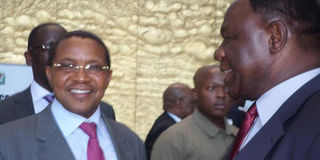Tanzania introduces tough new laws to regulate the media

Tanzanian President, H.E Jakaya Kikwete (left). A year after Members of Parliament rejected a Bill that, among other things, aimed at amending media laws to introduce harsh penalties, a new law which put stringent conditions for media operations has been introduced. PHOTO | NNENNA NWAKANMA
What you need to know:
- The penalties say any person who “publishes information which is intentionally or recklessly falsified or if it threatens the interests of defence, public safety, public order, the economic interests of the United Republic, public morality or public health; or is injurious to the reputation, rights and freedoms of other persons; commits an offence and upon conviction, shall be liable to a fine of not less than Sh20 million or to imprisonment for a period not less than five years or to both”.
- The law also empowers the government to confiscate printing machines on which the seditious or defamatory publications are printed or reproduced.
- Section 14(b) (iv) of the proposed law reads: “Hook up with public broadcaster for news at 24 every day to enable the public to follow issues of national interest”.
A year after Members of Parliament rejected a Bill that, among other things, aimed at amending media laws to introduce harsh penalties, a new law which put stringent conditions for media operations has been introduced.
In addition to putting restrictions on people who want to operate as journalists, the Media Services Bill, which was tabled for the first time in the last Parliamentary session, seeks to control foreign ownership of media outlets.
According to section 13 (5) of the proposed law, “a foreign company may own a media house on condition that a shareholding structure shall not exceed 49 per cent”.
Harsh penalties against errant journalists which MPs rejected last year have been replicated in the new law.
RECKLESSLY FALSIFIED
The penalties say any person who “publishes information which is intentionally or recklessly falsified or if it threatens the interests of defence, public safety, public order, the economic interests of the United Republic, public morality or public health; or is injurious to the reputation, rights and freedoms of other persons; commits an offence and upon conviction, shall be liable to a fine of not less than Sh20 million or to imprisonment for a period not less than five years or to both”.
Such penalties are not exclusive to journalists as any person “who imports, publishes, sells, offers for sale, distributes or produces any publication or any extract of it, the importation of which is prohibited, commits an offence and shall be liable upon conviction for the first offence to a fine of not less than Sh5 million or to imprisonment for a term of not less than three years or to both”.
The law also empowers the government to confiscate printing machines on which the seditious or defamatory publications are printed or reproduced.
In what has incensed private media owners, the government seeks, through the anticipated law, to force them to join the public broadcaster for the prime 8pm news every day.
PUBLIC BROADCASTER
Section 14(b) (iv) of the proposed law reads: “Hook up with public broadcaster for news at 24 every day to enable the public to follow issues of national interest”.
The government also wants to introduce the Media Services Council, whose main objective would be to monitor and manage media operations.
The functions of the council have been listed as “monitor radio and television broadcast content; monitor social media content; monitor print media content compliance to licence, conditions and professional ethics; analyse print and electronic media content; licence newspapers; licence broadcasting content providers; regulate the activities of media houses and licence social media and news agencies, among others”.
The government also established the Journalists Accreditation Board, which will have powers to fine errant journalists, publishers and media houses; deregister journalists; fix rates and charges and approve contents of training curriculum and other standards pertaining to journalism.




